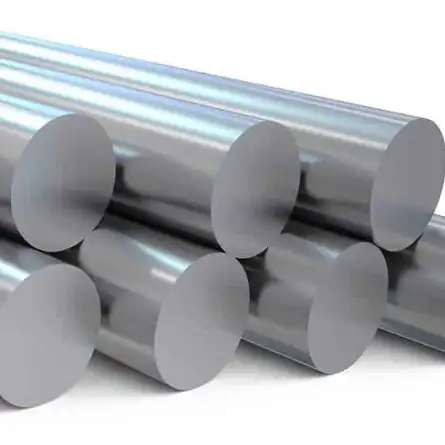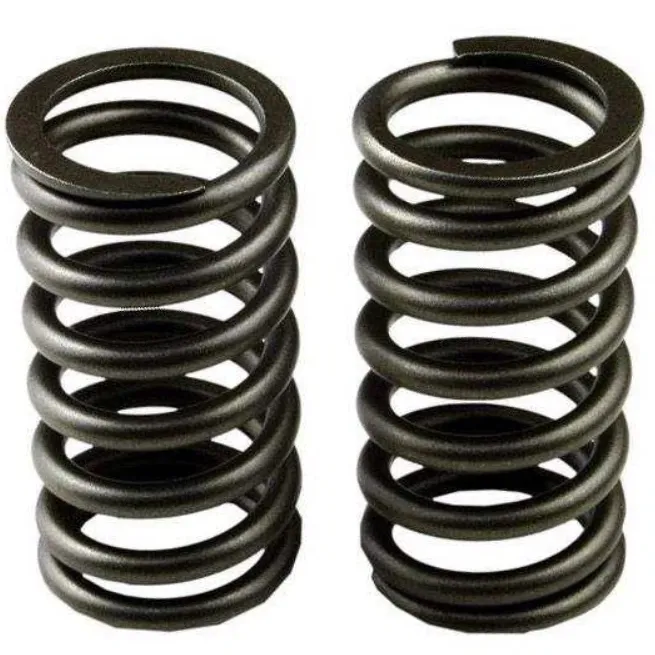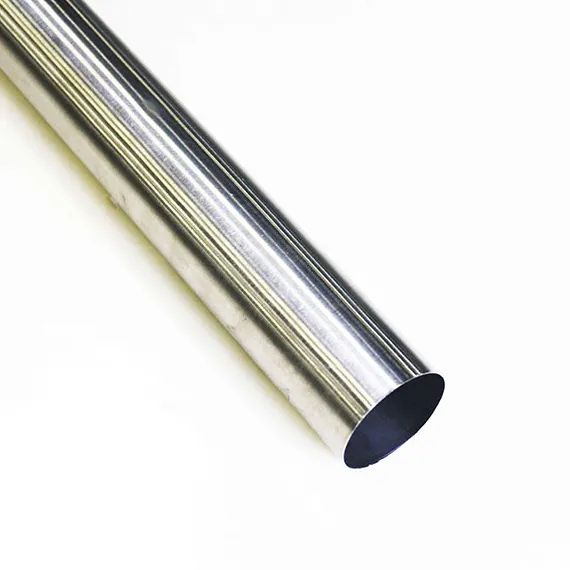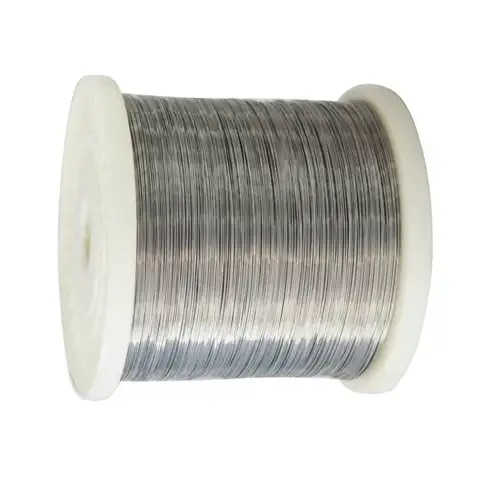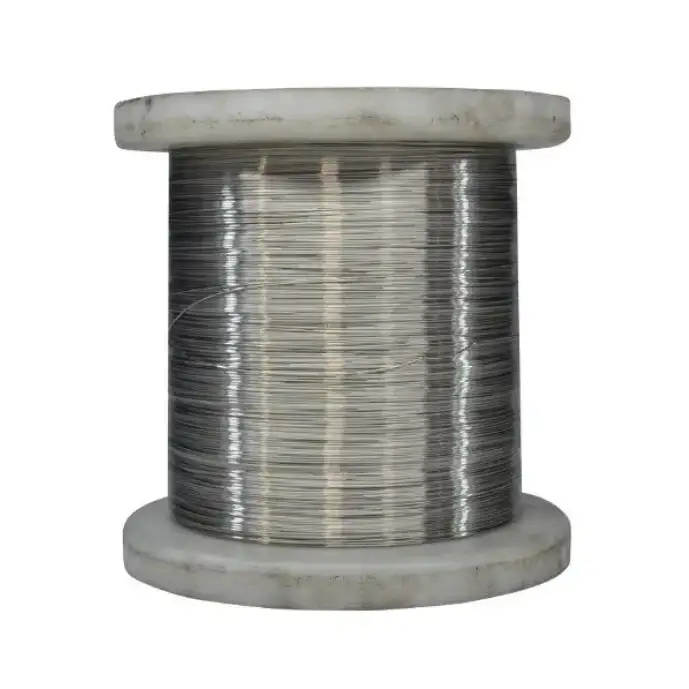MP35N round bar is an age-hardenable nickel-cobalt superalloy that combines very high strength (work-strengthened tensile values that can exceed 260–300 ksi / 1793–2068 MPa in cold-worked & aged conditions) with exceptional resistance to seawater, hydrogen sulfide (sour) environments and general corrosion. For demanding oil & gas, subsea, medical, and aerospace parts where smaller sections with very high mechanical performance and superior SCC resistance are required, MP35N is frequently the material of choice. If you need certified AMS 5844 / UNS R30035 round bar supplied from China at factory pricing with fast stock delivery, MWAlloys can supply AMS-specified MP35N round bars, shipped directly from mill inventory with 100% factory pricing and expedited lead times.
What is MP35N material?
MP35N (also referenced as UNS R30035, W. Nr. 2.4999, and commonly supplied to AMS 5844 / AMS 5845 / ASTM F562 variants) is a cobalt-nickel-chromium-molybdenum quaternary alloy produced by vacuum melting (VIM/VAR) followed by cold work and aging to develop ultra-high strengths. It is non-magnetic in many conditions, biocompatible (used for implantable devices), and notable for being one of the highest-strength corrosion-resistant alloys approved for unrestricted sour-service in oil & gas.
Key mechanical & physical properties (typical values)
Below is a concise property table for common product conditions. Values vary with mill lot and exact processing (annealed vs cold-worked vs aged). Use the supplier certificate for design calculations.
| Property | Annealed (typ.) | Cold-worked & Aged (typ.) | Units |
|---|---|---|---|
| Ultimate tensile strength (UTS) | 120–140 ksi (827–965 MPa) | 220–300 ksi (1517–2068 MPa) | ksi (MPa) |
| Yield strength (0.2% offset) | ~60 ksi (414 MPa) | 175–260 ksi (1206–1793 MPa) | ksi (MPa) |
| Elongation (A)% | ~40–70% | 3–20% (depends on % cold work) | % |
| Hardness (HRC) | ~20–38 HRC (depends on tempers) | up to 55 HRC (aged/spring temp) | HRC |
| Density | ~8.4–8.6 g/cm³ (≈ 8.43 kg/dm³) | same | g/cm³ (kg/dm³) |
| Service temp (max continuous) | ≈ 400–450°C (≈ 750°F) | similar (check metallurgist guidance) | °C (°F) |
| Magnetic behavior | Generally non-magnetic | Generally non-magnetic | — |
Load-bearing citation: the high strength and sour-service approval are documented in primary mill literature and technical white papers.
Chemical composition (nominal / typical ranges)
Typical MP35N chemistries used in aerospace and oil & gas are tightly controlled under AMS 5844 / AMS 5845 and related specs. The table below shows the commonly quoted composition ranges (weight %).
| Element | Typical range (wt%) |
|---|---|
| C | ≤ 0.025 |
| Mn | ≤ 0.15 |
| Si | ≤ 0.15 |
| P | ≤ 0.015 |
| S | ≤ 0.010 |
| Cr | 19.0 – 21.0 |
| Ni | 33.0 – 37.0 |
| Mo | 9.0 – 10.5 |
| Ti | ≤ 1.00 |
| Fe | ≤ 1.00 |
| B | ≤ 0.015 (trace control) |
| Co | Balance (major element) |
(Designations: UNS R30035, W.Nr. 2.4999, AMS 5844/5845 mirror these limits.)
Heat treatment, work hardening & typical product conditions
MP35N gains much of its strength by controlled cold deformation (work hardening) and an aging step. Key points:
-
Annealed / solution-treated condition: soft, good ductility, easier machining/forming. Typical tensile in this state ~120–140 ksi.
-
Cold-worked + aged (typical fastener/spring conditions): with controlled aging (example: 1000–1200°F for specified times per NACE/AMS tables), tensile and yield climb into the high hundreds of MPa up to the 2000+ MPa range. Aging schedules and hardness limits are defined in AMS 5844 and in NACE MR0175 for sour service. Heat treatment and ageing must be performed by mills with approved procedures — avoid re-ageing in finished parts without mill approval.
Hardness, tensile & fatigue notes
-
Hardness after aging can reach ~50–55 HRC in certain spring conditions; NACE/ISO limits set maximum hardness for specific sour-service uses (to prevent SCC risk).
-
Fatigue resistance is excellent for a non-ferrous high-strength material but depends strongly on surface finish, cold work, and environment. For dynamic fasteners and springs, correct aging and control of surface quality is essential.
Corrosion resistance and sour-service (NACE MR0175 / ISO 15156)
MP35N is widely used in oil & gas because it combines high strength with excellent resistance to sulfide stress corrosion cracking (SCC) and chloride environments. It is referenced/approved in NACE MR0175 / ISO 15156 guidance as one of the higher-strength corrosion-resistant alloys suitable for H₂S (sour) conditions when supplied and heat-treated per the standard and mill certification. For critical sour-service bolting and downhole components MP35N is often the only commercially available alloy that provides both very high tensile strength and approval for unrestricted sour service, with specified hardness ceilings in the standards.
Manufacturing forms, machining, and joining guidance (round bars)
MP35N is stocked and sold as round bar, rod, wire, strip, tubing and forged blanks. Manufacturing notes for round bar:
-
Melting practice: VIM / VAR and sometimes ESR to ensure low inclusion levels and lot homogeneity; AMS specs usually require VIM-VAR for critical aerospace/oil & gas uses.
-
Machining: In annealed condition it machines similarly to austenitic stainless steels, but in higher tempers it is difficult — use rigid set-ups, high-performance carbide or CBN tooling, and conservative cut depths. Coolant and tool geometry matter.
-
Welding: should be avoided for high-strength applications unless weld procedures are qualified — welded zones may need post-weld heat treatment and will not regain full aged strength. For bolting and precision components, forming and cold-work + mill ageing is the typical route rather than welding.
-
Stock supply: typical diameters available from major mills and distributors — contact MWAlloys for available sizes and mill certification (mill test report with AMS / ASTM / NACE stamping).
MP35N vs Inconel 718
Both are high performance nickel alloys, but the design intent and performance envelopes differ:
| Feature | MP35N (UNS R30035) | Inconel 718 (UNS N07718) |
|---|---|---|
| Primary base | Nickel-Cobalt alloy (Co + Ni dominant) | Nickel-Iron-Chromium with Nb/Ta precipitates |
| Typical max tensile (aged/worked) | Up to 260–300 ksi (1793–2068 MPa) | Up to ~150–220 ksi depending on heat treatment |
| Corrosion / sour service | Excellent, NACE MR0175 approved for unrestricted sour service (when spec’d). | Good corrosion resistance; N07718 is corrosion resistant but not generally used where MP35N's combined ultra-high tensile + sour approval is required. |
| Hardness | Can reach >50 HRC (certain tempers) | Typically lower in equivalent tempers; 718 can be precipitation hardened to high strengths but different SCC profile. |
| Machinability | Difficult in hardened condition | Very difficult when precipitation-hardened; machining guidelines required |
| Typical applications | Springs, fasteners, downhole tools, medical implants, subsea bolting | Turbine discs, rings, high-temp fasteners, aerospace structures |
| Price (relative) | Typically higher per kg due to cobalt content and complex melt route | Generally less expensive than MP35N per kg |
Conclusion: choose MP35N when ultra-high strength + superior corrosion/SCC performance in sour/seawater is mandatory; choose 718 where high temperature creep resistance and well-characterized precipitation hardening for elevated temperature service are primary needs.
What is MP35N equivalent to?
In terms of designation equivalence, MP35N is commonly cross-referenced as:
-
UNS R30035 (primary UNS number)
-
W. Nr. 2.4999 (Werkstoff number)
-
AMS 5844 / AMS 5845 (bar/rod quality and processing specifications)
-
ISO / ASTM: ASTM F562 covers MP35N in certain forms for medical use and ISO references exist for implantable materials (ISO 5832-6 can overlap for cobalt-nickel alloys).
In performance, there is no single direct alloy that exactly duplicates the MP35N balance of very high strength and sour-service approval — some precipitation-hardening stainless and titanium grades can approximate strength or corrosion resistance, but they lack the full combination of attributes. Always treat “equivalent” as either a chemical designation equivalent (like UNS/WNr) or an engineering substitute which should be validated by testing and standards comparison.
2025 global price snapshot
Material markets fluctuate with raw material surcharges (nickel, cobalt), manufacturing capacity and order quantity. Below is a representative 2025 snapshot of supplier asking prices for MP35N round bar/wire from publicly listed distributors and China B2B offers (use for budgeting only; obtain current quotes and MTR-certified offers for procurement).
Notes: prices are indicative sellers’ listings and B2B platform offers captured in 2025; final mill quotes depend on quantity, spec (AMS 5844 vs industrial), melt practice (VIM/VAR/ESR), certification and shipping.
| Region / Source (2025) | Form & MOQ | Indicative price (USD/kg) | Source reference |
|---|---|---|---|
| China B2B suppliers (Made-in-China) | MP35N round bar, MOQ 100 kg | US$20–55 / kg (quantity breaks) | supplier listing |
| Alibaba (multiple listings) | small samples to tonnage | US$12–60 / kg (wide range by MOQ/spec) | marketplace listings |
| European specialist stockist (Auremo listing) | Small diameter precision rod | market quotes show higher per-piece pricing (specialty) | product catalog listing |
| North American mill/distributor | AMS-certified MP35N (small runs) | Typically marked up above China due to certification & inventory — request RFQ | major distributors (contact for quotes) |
Caveat: MP35N contains significant cobalt and nickel — surcharges and raw material indices materially affect the per-kg cost. For firm procurement numbers ask MWAlloys for an MTR-backed RFQ; MWAlloys offers 100% factory pricing from Chinese mill stock (we can provide firm, certified quotes with current surcharges and lead times).
Typical applications and selection examples
-
Oil & Gas downhole tools & bolting: pump shafts, load pins, packer components, and bolting where sour gas/ H₂S exposure is a risk.
-
Subsea valves and connectors: seating and stem components requiring small, strong parts with crevice-corrosion resistance.
-
Medical implants and devices: because of biocompatibility and corrosion performance (ISO / ASTM medical forms).
-
High-performance fasteners & motorsport components: where size reduction and fatigue life matter.
-
Springs for high stress, corrosive environments.
Engineers select MP35N when part size must be optimized without compromising strength or when NACE/ISO 15156 approval is explicitly required.
Supply chain, quality control, and why choose MWAlloys
MWAlloys is a Chinese manufacturer and global supplier of specialty alloy round bar, including MP35N (UNS R30035 / AMS 5844). Why MWAlloys for MP35N round bar?
-
Factory pricing: MWAlloys sells direct from mill channels — our quotes reflect 100% factory price (no middleman markup).
-
Inventory & fast shipping: we maintain stock in typical diameters and can expedite certified shipments for urgent orders.
-
Mill certificates & traceability: full MTRs (chemical & mechanical) available per AMS / ASTM requirements; VIM/VAR melt practice documented on request.
-
Quality control: inspection and testing (hardness, tensile, PMI, NDT where required) before shipping.
-
Application support: technical data, suggested aging schedules and compatibility guidance for sour service.
Contact MWAlloys purchasing for an immediate RFQ — include required spec (AMS 5844/AMS 5845/ASTM F562), diameter/length, heat treatment condition, MTR requirement and destination to get a firm lead time and landed price.
FAQs
-
Is MP35N suitable for sour (H₂S) environments?
Yes — when supplied and heat-treated per NACE MR0175 / ISO 15156 and AMS specifications, MP35N is one of the highest-strength alloys approved for unrestricted sour service. -
What are the common designations for MP35N?
UNS R30035, W. Nr. 2.4999, and AMS 5844/5845 are the most referenced designations. -
Can MP35N be welded for high-strength applications?
Welding is possible but not recommended for strength-critical components without qualified procedures; welded zones will generally not regain full mill-age strength and must be handled per supplier guidance. -
What is the typical density of MP35N?
Approximately 8.43 kg/dm³ (≈ 8.43 g/cm³). -
How hard can MP35N get after aging?
In spring/fastener tempers MP35N can approach 50–55 HRC; NACE/ISO defines maximum hardness limits for sour service to avoid SCC risk. -
Is MP35N magnetic?
It is generally non-magnetic or weakly magnetic depending on condition; many users report non-magnetic behavior in common tempers. -
What are realistic lead times from stock?
If in stock, MWAlloys can typically ship within days; if mill orders or special AMS melts are required, lead times lengthen — contact for a dated RFQ. -
Are there lower-cost substitutes?
Some PH stainless steels and nickel alloys approximate some MP35N properties, but none perfectly match the MP35N combination of ultra-high strength plus NACE sour approval. Use an engineering trade-off analysis before substituting. -
Can MP35N be used at elevated temperatures?
Continuous use up to ~400–450°C (≈ 750°F) is common, but strength and corrosion behavior depend on temp and exposure — consult the mill data sheet for elevated temp allowances. -
How should I specify MP35N in a purchase order for sour service bolting?
Specify UNS R30035 / MP35N, required AMS spec (e.g., AMS 5844), required melt practice (VIM/VAR/ESR), heat treatment condition, maximum hardness permitted per NACE MR0175 and request full MTRs and NACE/ISO conformity statements.
Final procurement checklist
-
Confirm designation and spec (UNS R30035, AMS 5844/5845, ASTM F562 if medical).
-
State melt practice required (VIM / VAR / ESR).
-
State condition (annealed / cold-worked / aged) and maximum hardness allowed.
-
Request MTR and any NDT/traceability paperwork.
-
Confirm MOQ, lead time, incoterms and surcharges (nickel/cobalt).
-
Request sample coupon or small trial order if critical.

